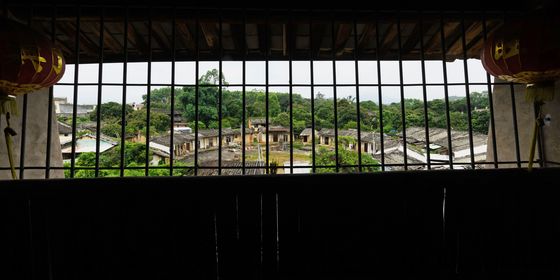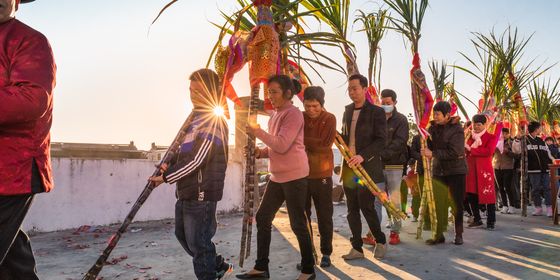On Qingming Festival, here’s a look at some ancient Chinese mourning rituals, from costume and diet, to mourning periods and wedding bans
This year’s Qingming Festival, or Tomb Sweeping Day, comes at a time when the whole nation is saddened by the tragic crash of Chinese Eastern Airlines flight MU5735 on March 21 in Guangxi, in which all 132 passengers and crew perished.
On March 27, the seventh day since the disaster, rescue workers and victims’ family members held a solemn ceremony at the crash site to pay respect to the deceased. Many locals also gathered outside the site to mourn, bringing flowers and notes. Netizens on social media sent prayers, while major websites and social media accounts made their landing pages and profile images black and white.
According to tradition, the “seventh day (头七 tóuqī)” since a person’s death is when their spirit will revisit the living world one last time. In the past, China has declared a number of national days of mourning on the seventh day after a serious tragedy, such as the Sichuan Earthquake in 2008 and the Qinghai Earthquake in 2010.
Many families today still follow touqi mourning practice. Family members set up an altar with incense, candles, and other offerings, and burn paper money on the seventh day after a loved one’s decease. In the evening, the family prepares a meal to treat the spirit of the deceased returning home. But they should avoid getting up in the night, in case the spirit sees them and becomes attached to the living world, preventing them from being reincarnated.
Mourning rituals were essential in ancient Chinese societies. The imperial court would declare a period of national mourning, or guosang (国丧), when a ruler or important member of the royal family died. During the Spring and Autumn period (770 – 476 BCE), it was considered immoral to wage war against a state during their national mourning period. The Commentary of Zuo (《左传》), a narrative history of political, diplomatic and military events from eighth to fifth centuries BCE, recorded several cases of enemy armies withdrawing from their adversary’s land when guosang is declared in the middle of a war.
Being in mourning, called jusang (居丧) or shousang (守丧), was also considered important rite for maintaining order in a Confucian society. The length of the mourning period, food, appropriate behaviors, living conditions, and dress were all important aspects of mourning rituals stipulated in the Book of Etiquette and Ceremonies (《仪礼》) and the Book of Rites (《礼记》), classic Confucian texts on propriety and behavior in the Zhou dynasty (1046 – 256 BCE).
According to these texts, the mourning period could last from three months to three years, depending on the closeness of relation and the seniority of the deceased to the mourner. During this time, eating meat, drinking alcohol, holding weddings, and indulging in all kinds of entertainment were prohibited.
Mourning outfits were divided into five classes. The clothes worn by those considered closest to the deceased (minister to emperor, son and unmarried daughter to father, and wife to husband) were the crudest, made of coarse hemp cut with knives, representing the deepest level of grief. Each class of clothing from there, all made of linen, became increasingly more refined the more distant the relationship to the deceased. The term “five costumes (五服 wǔ fú)” is still used as an idiom to refer to the core members of a family in many parts of China today.
The Analects (《论语》) records a disciple named Zaiwo (宰我) once challenged Confucius about the three-year period required for mourning one’s parents. He argued that this was too long a period for not holding ceremonies or playing music, since rites and music are so important to Confucian beliefs. Confucius explained that since children spend their first three years in the arms of their parents, it is only fair to repay their parents’ care with a mourning period of equal length.
After Confucius died, his disciples treated him as a father and mourned for him for three years, although without the mourning costumes, which were reserved for blood kin. This mourning ritual of students toward their teachers is called xinsang (心丧 xīnsāng, “grift at heart”). One of Confucius’s most loyal disciples, Zigong (子贡), even built and lived in a small hut to guard the grave of his master for six years.
During the Qin dynasty (221 – 206 BCE) and the beginning of the Han dynasty (206 BCE – 220 CE), national mourning was a huge event. On the death of an emperor, the entire country had to dress in mourning consume for three years and live without meat, wine, weddings or entertainment—all enforced by law. But the third Han emperor, Emperor Wen, decided that this was too serious a burden on common people, and shortened the period to 36 days, and made only nobles and officials follow most of the prohibited activities. In the Tang dynasty (618 – 907), the national mourning period was further shortened to 27 days.
Still, family mourning rituals were no less serious business, as ancient Chinese rulers believed in “ruling the country with filial piety (以孝治天下),” a phrase first used by Li Mi (李密), a Western Jin (265 – 317) official, in his famous memorial to the court, “A Statement of One’s Sentiment (《陈情表》).”
In the Tang dynasty, hiding the news of a deceased parent or husband, failing to practice mourning rituals (such as not wearing mourning clothes, consuming meat and wine, hosting acrobats or opera performances, or even attending a celebratory banquet within the 27 months of the death) could be punished by a year’s forced labor. But the most absurd rule was that women should not get pregnant within the 27 months, hinting that couples should not have sex during the mourning period. Failure to abide was also punishable by a year of forced labor.
In the Ming dynasty (1368 – 1644), when Buddhism, Daoism, and folk beliefs of reincarnation flourished, it was fashionable for common people to host religious rituals during funerals and mourning periods. The Ming government later regarded such practices as being against the Confucian idea of solemn mourning, and ruled to flog the hosts of these rituals and force the monks involved to return to secular life. However, various records and anecdotes from the period suggest these laws were not always strictly enforced, giving room for common people to develop many folk mourning customs involving singing, dancing, and monks that survive today.
Mourning rituals could affect politics, too. One important mourning ritual for officials or scholars that began in the Han dynasty obligated them to put their careers on hold when their parents passed away. Called dingyou (丁忧), the tradition meant officials had to resign immediately and return to their hometown to mourn for 27 months to three years, depending on the dynasty. Scholars, on the other hand, were prohibited from taking the imperial exam during the mourning period.
Although they could return to their original position, the mourning leave was typically a setback to the official’s career. Their political opponents may also take the opportunity to scrutinize their behavior during the mourning period and report any transgressions to the court, leading to a demotion. Famous Tang poet and official Bai Juyi (白居易) was a victim of such a scheme. During his mourning period for his mother, who accidentally drowned in a well while appreciating flowers, he wrote two poems titled “Appreciating Flowers” and “A New Well,” which were not related to the accident. This was reported to the imperial court by his opponents, who claimed it to be an unfilial act. Bai was demoted from his position in the central government to a provincial position.
Of course, there were always exceptions. If the emperor regarded certain officials too important to leave their duties, he could order them to stay in the posts during the mourning period, an act known as duoqing (夺情). One famous incident involved Ming dynasty politician Zhang Juzheng (张居正), who served as Senior Grand Secretary, in effect the top job in the government. He was in the middle of a political reform when he learned his father had passed away. Though he appealed to the emperor many times to resign, the emperor refused. Zhang had to stay on the job, and find a way to mourn while getting on with his daily life—similar to how many people grieve today.












